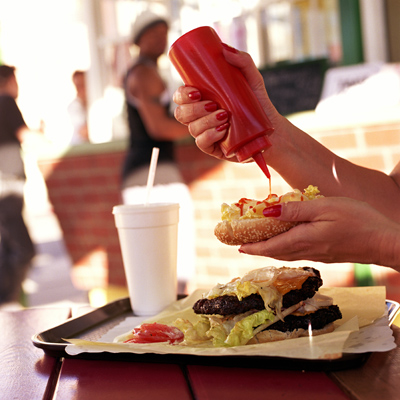
Recipes for disaster?
By Amanda MacMillanWho doesn't love a good burger? Unfortunately, not all hamburgers, or even turkey or veggie burgers, are created equal. Cooking method, portion size, and choice of bread and toppings can mean the difference between a relatively harmless lunch and a day's worth of calories, fat, and sodium.
We rounded up some of the healthiest and unhealthiest examples of what American restaurants are serving between two buns, and got an expert's feedback on the nutritional pitfalls. Here's what to look for—and what to stay far away from—the next time a burger craving hits.
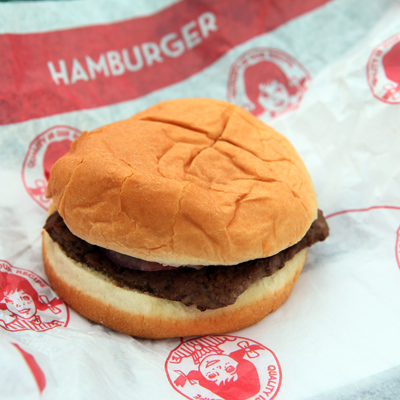
Best plain burger patty
Wendy's Jr. HamburgerA healthy rule of thumb is to keep your meal around 500 calories, says Katherine Brooking, a registered dietitian and cofounder of AppforHealth.com, but that can be hard with big juicy burgers and lots of fixings. You're generally safe, though, with the plainest, smallest burger available.
"If you stick with a plain single patty, you may even be able to have a small order of fries," she says. All the major drive-throughs have similar plain offerings, but Wendy's Jr. Hamburger—at just 230 calories, 8 grams of fat (3 grams saturated), and 470 milligrams of sodium—is the least nutritionally offensive.
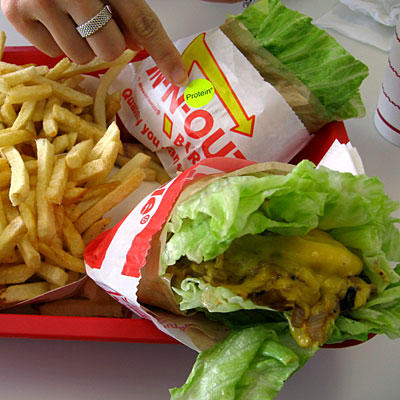
Best low-carb burger
In-N-Out Burger's Hamburger With Onion, Protein StyleHealth-conscious Californians love to order their burgers from this West Coast chain "protein style," which means the bun is replaced with a lettuce wrap. (The simple swap can save you 150 calories and 28 grams of carbohydrates.)
Here, a hamburger with onion and no bun has 240 calories, 17 grams of fat (4 grams saturated), and 370 milligrams of sodium; ask for ketchup and mustard instead of their signature spread to save another 80 calories.
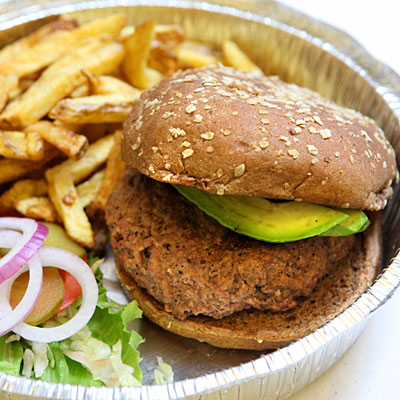
Best other-meat burger
Ted's Montana Grill's Skinny Dip Bison BurgerWant a more health-conscious burger but can't give up the meat? Bison (or buffalo) has fewer calories and less saturated fat than beef, says Brooking, making it a good substitute for picky carnivores.
At this chain founded by media mogul Ted Turner, you can order any burger with beef or bison meat. The Skinny Dip bison sandwich, served on an oat-and-wheat bun and topped with avocado slices, will run you 606 calories, 29 grams of fat (7 grams saturated), and—watch out!—1,973 milligrams of sodium; go bunless to save 210 calories and 360 milligrams of sodium.
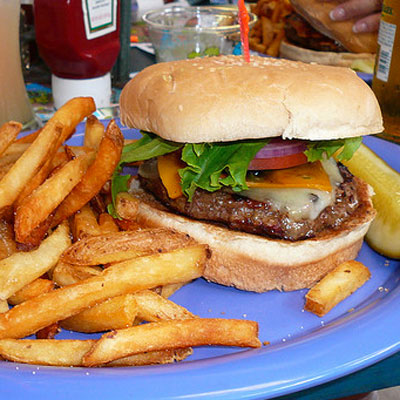
Best gluten-free burger (with bun!)
Cheeseburger in Paradise's Back to Basics BurgerJimmy Buffet's tropics-themed establishment offers beef, turkey, and veggie burgers, as well as seafood and chicken. And now they're all available on gluten-free buns, which have 250 calories and 9 grams of fat—5 grams saturated.
The restaurant has long offered a gluten-free menu and modified meals for those with a gluten intolerance. But with this new addition, diners with celiac disease or gluten sensitivity can finally enjoy burgers the same way the rest of us can—utensil free, between two pieces of bread.
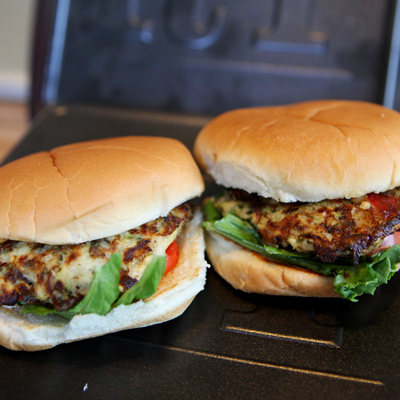
Best sliders
Ruby Tuesday's Zucchini Cake MinisDon't let size fool you. A serving of mini burgers at some chains can easily cost you more calories than a single normal-size sandwich. (Chili's Big Mouth Bites dinner served with ranch dressing and fries totals more than 2,100 calories!)
Ruby Tuesday's combination meals, which let you pair mini burgers with soup or salad, is the smartest choice we found. Our favorites are the delicious zucchini cake patties—made with roasted red peppers and feta cheese—with 580 calories, 22 grams of fat (3 grams saturated), and 1,714 milligrams of sodium.
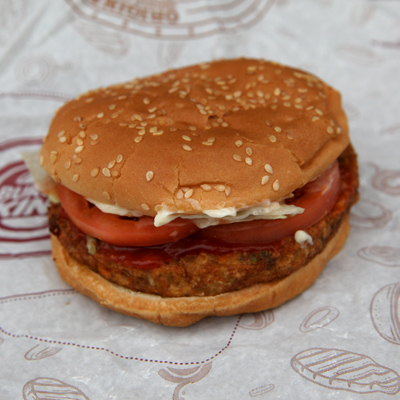
Best meatless drive-through burger
Burger King's BK Veggie BurgerEven vegetarians can have it their way with Burger King's Morningstar Farms Garden Veggie patty on a sesame-seed bun with lettuce, tomato, ketchup, and mayo. Order it without mayo and it's only 320 calories, 7 grams of fat (1 gram saturated), and 960 milligrams of sodium.
Brooking says high amounts of sodium are difficult to avoid in fast-food burgers. The current recommendation for most people is no more than 2,300 milligrams a day (about a teaspoon of table salt), because high-sodium diets can raise blood pressure and contribute to heart disease.
http://www.health.com






0 comments:
Post a Comment